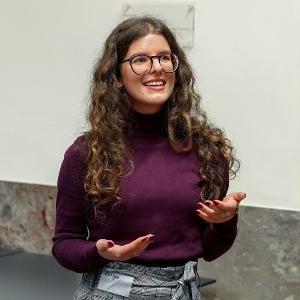Barrier-free access: “A new perspective!”
26 Mar 2024
A service that benefits everyone: The next round of training for inclusion tutors begins in April 2024.
26 Mar 2024
A service that benefits everyone: The next round of training for inclusion tutors begins in April 2024.

takes part in inclusion trainings for volunteers. | © LMU
Too narrow, too dark, too loud, too complicated: Navigating everyday life at university is not easy if you cannot see or hear very well. ADHS, autistic spectrum disorders and depression can likewise make life hard for students. Especially when getting started, there are so many questions: How do I find the seminar room? Will my wheelchair fit in the elevator? What do I have to do to ensure that my disabilities are taken into account in my grades? The inclusion tutors at LMU are there to help people answer such questions. They are trained to help students with disabilities. But they themselves also benefit from their commitment!
When starting out at university, Nini Sturm needed a huge amount of support. She suffers from Usher syndrome, which leaves her with both bad eyesight and poor hearing. For her, the corridors in LMU’s main building are far too dark: She basically has no chance of finding her way around through the gloom. A friend therefore accompanied her around the building. Along the way, Sturm counted the lamps and the stairs: “I had to learn to find my bearings,” she says.
Today she is in the middle of her master’s degree course and helps others to find their way around, too. An expert in this field, she explains to the students training as inclusion tutors what it is like to live with disabilities. But she doesn’t just talk about what budding tutors can do to help: She speaks out of the experience of knowing what it feels like to walk down a corridor when you can hardly see anything.

“Especially as a medic, you reap huge benefits from the training.” | © privat
Some forty inclusion tutors across virtually all faculties are currently in active service at LMU. They learn a lot during their three-week training course. For example, they discover that getting to a seminar room in a wheelchair is far from easy. A curbstone presents problems here, a tight corner there. And if the ramp is too steep, an alternative route has to be found.
At one interactive Moodle course, the future inclusion tutors wear special glasses to learn what it feels like to have impaired vision. They plug their ears to make it more difficult to hear, and play with pegs to disrupt their own concentration while learning things by heart.
Medical student Clara Oberste-Wilms was impressed by the sheer variety of challenges that confront students with disabilities: “Especially as a medic, you reap huge benefits from the training. In our profession we obviously encounter more people with disabilities. So, what we learn can be applied in every situation to better support patients. I think it’s great to be able to grow into this role while I am still studying.”

studies digital inclusion. | © LMU/Muhammad Muneeb Saleem
Computer science student Chrysa Bika is similarly enthusiastic about the training: “I learned all kinds of things I wasn’t previously aware of,” the master’s student says. She has concerned herself with the topic of digital inclusion since her undergraduate days, and that inspired her to train as an inclusion tutor: “It is important to know the basics and gain an awareness of these issues.” For her, it was particularly important to listen to students with disabilities and, in this way, to learn what kind of support they would like to see. “That was a completely new perspective for me!” she says.
After completing the three-week inclusion tutor training program, she and the other participants set up an Instagram account to raise awareness of this voluntary service. She was able to advise one high-school leaver who was afraid that his depression would cause him to miss too much during his studies. And she is really happy that she was able to help one student have his disabilities factored into his grades – simply by talking to his sister about the possibility.
“Every year, we train people who are really passionate about this issue!” says Loreen Böckeler of the Advisory Service for Students with Disabilities and Chronic Conditions, a subset of the wider Student Advisory Service. LMU has now been offering to train inclusion tutors for six years. The inquiries from people who use this service vary greatly: One needs an introduction to the campus. Another needs someone to go with them to meetings with lecturers. Forms have to be filled out, study plans drawn up. The tutors also help students with ADHS to map out a regular daily routine. As such, they become a “source of calm” amid the stressful day-to-day hassle of university life, in Loreen Böckeler’s words.
Medical student Clara Oberste-Wilms hopes that her “work as an inclusion tutor will make the university routine a little bit easier for other students”. Despite the stresses and strains of her own study course, she finds the time she needs. This particular voluntary service does not present too heavy demands: Sometimes, even just a brief chat can achieve a lot. As Oberste-Wilms puts it: “You’ve just got to plan things well, then you can always find the time.”